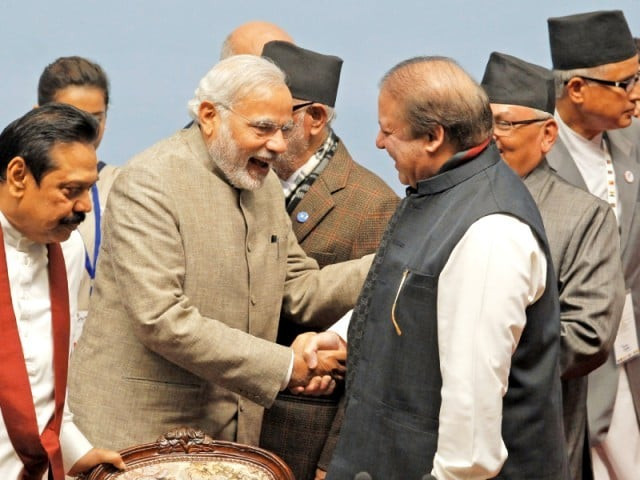Talking peace with India
Just as everything in Meereen revolves around slavery, everything in Pakistan centres on India and Partition of 1947

Indian Prime Minister Narendra Modi and Prime Minister Nawaz Sharif shakr hands at Saarc summit. PHOTO: AFP
Just as everything in Meereen revolves around slavery, everything in Pakistan centres on India and the Partition of 1947. The threatening neighbour to the east has, as the story goes, sought to bring an end to the state of Pakistan. It never accepted the state, blocked access to finances, occupied Kashmir and sought to asphyxiate Pakistan at birth. In 1971, India fuelled an insurgency that ultimately led to the ignominious surrender of Dhaka. East Pakistan became Bangladesh, and India now only had to worry about its western flank. Today, the enemy surrounds the state from the outside and fuels violence from within. A right wing, anti-Pakistan government rules from Delhi and it will not stop at anything. The enemy has spread its tentacles in Balochistan and Karachi, leading to crippling violence over the last decade.
India test-fires advanced interceptor missile
After a few carafes of wine, Tyrion would conclude that the status quo is bleeding Pakistan dry. Engulfed in an arms race with a neighbour with a superior economic capacity, Pakistan simply cannot keep up. The successful testing of an interceptor missile as part of India’s Ballistic Missile Defence Programme is yet another setback in the arms race. It casts a shadow over Pakistan’s rapid development of tactical nuclear missiles, and further nudges the military balance of power in India’s favour. So what does one do? Make peace and stop the bleeding for a little while. The decades-long quest to free Kashmir and the blinding desire to have military parity with a much-larger neighbour has been futile. Instead, the dwarf would advise to develop a different weapon: money. Pakistan’s geography is such that the country can connect the energy-starved regions of China and India to the energy-rich republics of Iran and Central Asia. A peace, even of a temporary nature, would bring the political stability necessary for large-scale investments. Energy would flow east and north to India and China’s western frontier. Goods would flow west to Iran and Central Asia. Pakistan would benefit from both sets of transactions: meeting its own energy needs from the energy corridors, and charging a transit tax for the flow of goods.
Without peace with India, the China-Pakistan Economic Corridor, which is the north-south realisation of Pakistan’s value as a geographic transit corridor, will remain marred with high risks. Violence in Balochistan, a region where the arch-enemy has a presence, will continue to slow down progress. Continued animosity will ensure that non-state armed groups, some of whom are still considered strategic assets, will earn a living as armed proxies for the highest bidder. These groups have led to disastrous terror attacks within the country, and have brought disrepute internationally. To ensure survival, the state has funded continued military operations in various parts of the country and drained the treasury. The result has been a dependency on foreign benefactors that have provided the money, but at a very high price.
Pakistan takes up India's controversial 'maps bill' with UN
The detractors of this approach would look at Tyrion with disgust. Make peace with the enemy for gold? Give up Kashmir for a trade corridor and some transit taxes? Forget about exacting revenge on the enemy? Absolutely not! This, however, is the most beneficial policy choice Pakistan can make in the coming years. It ties India and Pakistan in an economic tango. Ramping up tensions after increased investment would lead to a backlash from the economic elite in Delhi and beyond. Corporate interests from all the economies would temper the arms race in the region. And most of all, the peace will provide Pakistan with an opportunity to economically catch up with its rival. The liberation of Kashmir is in many ways the end goal of the detractors who would oppose peace with India. Yet, it is peace with India, and all the benefits associated with it, that would ultimately allow Pakistan to regain the diplomatic clout necessary to bring about a just resolution to the Kashmir conflict. So is such a peace possible? It might have been in the fantastical world created by George R R Martin, where dwarves such as Tyrion Lannister find themselves in positions of power. In Pakistan, making peace with India will most certainly get equated with becoming ‘friends’ with India. Such detractors must remember what a wise man once said: “We make peace with our enemies, not our friends.”
Published in The Express Tribune, May 19th, 2016.
Like Opinion & Editorial on Facebook, follow @ETOpEd on Twitter to receive all updates on all our daily pieces.














COMMENTS
Comments are moderated and generally will be posted if they are on-topic and not abusive.
For more information, please see our Comments FAQ